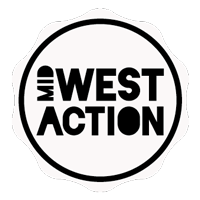My goal is to see one show per week. Yes, I might be that annoying friend that just has to tell you about the thing you missed, but I’m also catching every great show in the city of Chicago–with plenty more ahead of me. Welcome to the Chicago Concert Dispatch.
At the time of this show, it is 14 weeks into the year and I have seen 67 shows.
The audience at this sold out Empty Bottle show was impatient for things to get under way. I overheard several people talking about what time it was and when things were likely to kick off. Mdou Moctar was the only thing that was going to satisfy this them, making this a tough crowd for our opener.
TALsounds lulled us with her soft and gentle music. She built up layers slowly, methodically. Much like she does in the her other project, Good Willsmith, Natalie Chami used her voice as an instrument—adding effects to it, looping a syllable, distorting it so that the momentary meaning was lost within the layers piled on top of it. You could feel the audience chatting ebb and then return during her set, almost like an undercurrent to Chami’s (mostly) smooth and warm music. The moments in which she disrupted that smoothness were more striking–sounds like a rattling fan, or a stick against a chain link fence. Repetitive and metallic. When the notes turned dissonant, it made my skin crawl, in a good way.
There was a cheer as Mdou Moctar and his band made their way through the audience to the stage. In their traditional Sahara desert gear, they were instantly recognizable. Moctar is known for revolutionizing Tuareg-style guitar by electrifying it and giving it an audible edge. Most of the songs were off the new album Ilana which translates to “The Creator.” Although Moctar lives in his native Niger, the album was recorded at High Bias Recordings by engineer/producer Chris Koltay in Detroit, Michigan (Midwest connection!).
Moctar gave his guitar a unique voice, making extensive use of vibrato. His music is beautiful to hear to on studio albums, but to witness it in person was truly entrancing. I have never seen anyone tickle the strings as deftly as Moctar. He never used a pick, just his fingers. When he really got into the groove of a song, he leaned back, shimmied his shoulders, or hitched his leg in emphasis. Moctar sings with his voice, as well as his guitar, in his native Taurag language. I only wish there were more translations available to be able to feel the full impact of his lyrics and to understand the stories he’s telling.
The songs often started with a guitar tease, a taste of the theme they would meditate on. Then, each member would join to build around it. The drummer set the tone of the song. He held the sticks at their ends. It was a distinction I hadn’t thought about until I watched him use the full length of them. Keeping rhythm, but also peppering in complex fills under the music. Michael Coltun’s bass layered a walking melody under the music. The kick drum gave us the rhythm for our hips, the bass our feet. The rhythm guitarist, Ahmoudou Madassane, maintained the groove and pushed the music forward. I was really impressed with his subtle tempo increases, and how everyone else responded in time. All of these things came together to make for a perfect foundation for Moctar to make his guitar sing, and for the audience to have a dance party.
The music developed and circled around on itself. It built so slowly that I almost didn’t realize that they were giving it more and more. The crowd gave them more in return. It just felt so good to let them move me. If you go to a Mdou Moctar show–and I hope you do–it is best to lose yourself in the movement. By the end, I felt like I had shaken off all the ills that life had built up. They’d simply floated away, leaving me light and happy.
TALsounds Official | Facebook | Bandcamp | Instagram
Mdou Moctar Facebook | Bandcamp | Instagram

















You must be logged in to post a comment.